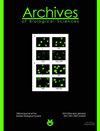杏鲍菇物种复合体某些菌株的生物学、形态学和系统发育
IF 0.8
4区 生物学
Q4 BIOLOGY
引用次数: 0
摘要
保存有价值的食用菌和药用菌基因库的有效方法是在离体培养基中保存菌种,并对保存菌种进行正确的鉴定和验证。不仅要考虑分子遗传学研究的结果,还要考虑文化、形态和生理特征作为附加标准。本文介绍了4株可食用和药用蘑菇的菌落和菌丝形态、生长特性和耐温性,以及作为nebrodensis菌株进入IBK蘑菇收藏的4株可食用和药用蘑菇的系统发育位置。所有菌株均为嗜中菌,在26℃时生长速度最快,为11.0 mm/d。而致命的温度是40度?所研究菌株的营养菌丝除了常见的吻合、丝链和钳状连接外,还在菌丝侧分枝上形成单个无色圆形排泄细胞。所有培养物均能在琼脂培养基上形成原基和子实体。系统发育分析表明,4株病原菌均不属于nebrodensis,但其中2株ibk1947、2035属于P. eryngii var. ferulae, 2株ibk1855、1927属于P. tuoliensis (P. eryngii var. tuoliensis)。本文章由计算机程序翻译,如有差异,请以英文原文为准。
Biology, morphology, and phylogeny of some strains of the Pleurotus eryngii species complex
Effective methods of preserving the gene pool of valuable edible and medicinal mushrooms are to maintain them in in vitro culture collections and to correctly identify and verify the preserved strains. It is necessary to consider not only the results of molecular genetic studies but also cultural, morphological and physiological characteristics as additional criteria. This article presents data on the colony and mycelial morphology, growth characteristics and temperature tolerance, and phylogenetical placement of four strains of edible and medicinal mushroom from the P. eryngii species complex received into the IBK Mushroom Collection as P. nebrodensis strains. All the studied strains are mesophiles with the fastest growth rate of 11.0 mm/day at 26?? and a lethal temperature of 40??. In addition to common anastomoses, mycelial strands and clamp connections, the vegetative mycelium of the studied strains formed single colorless round excretory cells on the lateral hyphal ramifications. All cultures were able to form primordia and fruit bodies on agar media. Phylogenetic analysis suggests that all four strains do not belong to P. nebrodensis, but two of them, IBK 1947, 2035 are P. eryngii var. ferulae, and two strains, IBK 1855 and 1927, belong to P. tuoliensis (P. eryngii var. tuoliensis).
求助全文
通过发布文献求助,成功后即可免费获取论文全文。
去求助
来源期刊
CiteScore
1.40
自引率
0.00%
发文量
25
审稿时长
3-8 weeks
期刊介绍:
The Archives of Biological Sciences is a multidisciplinary journal that covers original research in a wide range of subjects in life science, including biology, ecology, human biology and biomedical research.
The Archives of Biological Sciences features articles in genetics, botany and zoology (including higher and lower terrestrial and aquatic plants and animals, prokaryote biology, algology, mycology, entomology, etc.); biological systematics; evolution; biochemistry, molecular and cell biology, including all aspects of normal cell functioning, from embryonic to differentiated tissues and in different pathological states; physiology, including chronobiology, thermal biology, cryobiology; radiobiology; neurobiology; immunology, including human immunology; human biology, including the biological basis of specific human pathologies and disease management.

 求助内容:
求助内容: 应助结果提醒方式:
应助结果提醒方式:


